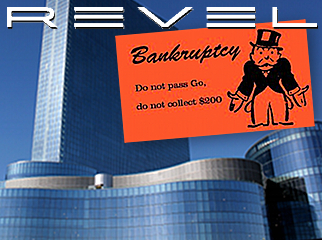 Troubled Atlantic City casino Revel is expected to officially file for bankruptcy on Monday, less than a year after the gaming joint opened with great expectations in April 2012. Revel’s owners filed disclosure statements with federal securities regulators earlier in the week, attesting to the fact that they can’t afford to carry its estimated $1.5b debt load any further. The Press of Atlantic City reported that the company has told creditors it intends to convert a little over $1b of that debt into equity for lenders, leaving a mere $272m in debt. Hard to believe, but investment bankers Morgan Stanley, who ate a $1.2b loss in 2010 rather than put one more dollar into the floundering project, now look like freaking geniuses for walking away when they did.
Troubled Atlantic City casino Revel is expected to officially file for bankruptcy on Monday, less than a year after the gaming joint opened with great expectations in April 2012. Revel’s owners filed disclosure statements with federal securities regulators earlier in the week, attesting to the fact that they can’t afford to carry its estimated $1.5b debt load any further. The Press of Atlantic City reported that the company has told creditors it intends to convert a little over $1b of that debt into equity for lenders, leaving a mere $272m in debt. Hard to believe, but investment bankers Morgan Stanley, who ate a $1.2b loss in 2010 rather than put one more dollar into the floundering project, now look like freaking geniuses for walking away when they did.
Despite losing $111m in its first year of operation, Revel optimistically states that it could turn a profit next year, so long as you factor out its debt servicing costs. Without that bit of accounting sleight of hand, profitability isn’t likely until 2017. In February, Revel ranked 10th on the revenue chart of Atlantic City’s dozen casinos. The casino, which cost a hefty $2.4b to construct, says that if it were sold tomorrow it would likely fetch a mere $246m to $331m on the open market. Still, that’s a good sight better than the $20m the Trump Plaza was sold for last month.
Last month, Revel announced that Jeffrey Hartmann, former CEO of Connecticut’s Mohegan Sun casino, would take over Revel’s day to day operations after chief exec Kevin DeSanctis and chief investment officer Michael Garrity resigned their positions. DeSanctis and Garrity will retain their positions in Revel Group, the holding company that owns the Revel brand. The pair will also receive around $7m in ‘consulting’ fees this year. You know, because their keen business sense is largely responsible for Revel’s, er, success?
Aside from the fact that the Atlantic City market has been in an uninterrupted swoon since its peak revenue year of 2006, much of the blame for Revel’s dismal performance has been attributed to DeSanctis’ and Garrity’s insistence that Revel be AC’s first totally non-smoking gaming joint. The Wall Street Journal reported that as Revel stumbled out of the gate, investors pleaded with DeSanctis and Garrity to “throw a party and have the Marlboro Man out front,” but these pleas fell on deaf ears.
While Revel’s brain trust eventually relented and agreed to add an enclosed smoking area, it must be noted that Macau is on pace to set a new monthly revenue record in March, despite a partial smoking ban that took effect Jan. 1. And while Las Vegas has also yet to return to its pre-recession revenue heights, it’s most recent annual revenue tally is down only 7.2% from 2006, while Atlantic City is off 41.5%. Clearly, Atlantic City broke a sizeable mirror sometime in the middle of the last decade, but on the plus side, perhaps those seven years of bad luck will expire in 2014?
